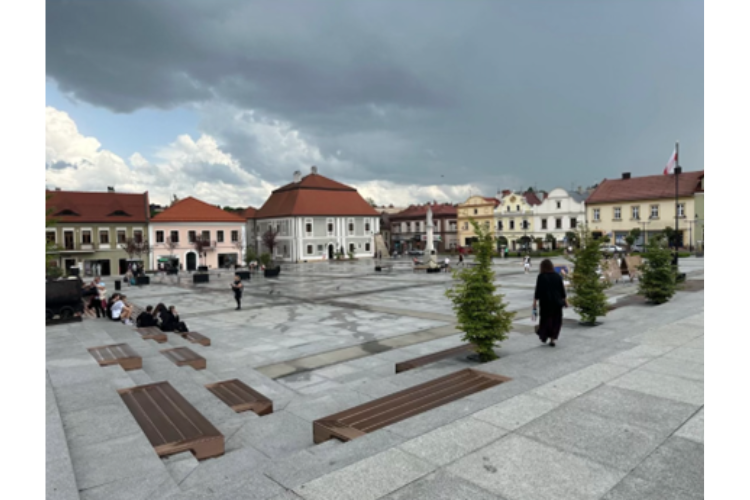Discovering Jewish Heritage in Poland: Beyond Ghettos and Camps

This piece is written by Becca Wilson, a rising sophomore at Oxford studying Political Science and Environmental Science. She is passionate about the intersection of public policy and sustainability. This summer she is serving as a congressional intern with Congressman David Scott.
When American Jews think of the Jewish experience in Poland they think of ghettos and concentration camps, painting a picture of a country synonymous with Jewish loss. However, through Professor Goldsteins’s Jews of Poland: History and Memory study abroad course, I learned about the nuances of Jewish life that extend far beyond death.
I developed an interest in Holocaust education throughout my lifelong Jewish Day school education which provided me with the opportunity to run the Holocaust, Education, and Remembrance club. Despite my access to quality Holocaust education, I always felt I was missing a piece of the puzzle: the essence of Jewish life in Poland outside the war. Thus, what drew me to Professor Goldstein’s course was its focus on Pre and Post World War II Jewish life. I wanted to learn about how Jews celebrated their identities and positively contributed to Polish society, a perspective the course allowed me to understand.
One of the most meaningful aspects of the trips was our day trips to Bochnia and IIza, small villages with significant Jewish presences prior to the war. In Bochnia, we learned about the Jewish people's role selling agricultural goods in Rynecks, town squares where traditional Polish markets took place. We saw a synagogue now occupied by a pet store, though it still holds a plaque honoring its history. We also visited a Jewish cemetery, now maintained by a non-Jewish husband and wife. Although there are no Jews left in Bochnia, it was impactful to learn how the community honors Jewish history.
In IIza, a rural Polish town, we connected with a non-Jewish historian who has devoted his life to learning about IIzian Jewish history. He has played a crucial role in preserving pre-war Jewish artifacts, such as kosher pottery, and has even identified every Jew who has ever lived in Ilza, including the location and date of their residence. Though it was sad seeing the impact the Holocaust had on stripping these small towns of Jewish life, the opportunity to visit with local historians provided a more nuanced view of the significant contributions Jewish people have made to Polish history.
In addition to learning about pre-war Jewish life, one of the most special parts of the trip was gaining insight into modern Jewish life in Poland. In both Krakow and Warsaw we connected with Jewish young adults from their respective Hillels and learned alongside students from the Institute of Jewish Studies of the Jagiellonian University. These experiences provided much insight into what it is like being a Jewish young adult in a county with a small Jewish population. I discovered that many young adults are just learning of their Jewish identities, and are interested in exploring them further. Our visit with influencer Miriam Synger and attendance at the Krakow Jewish Community Center’s (JCC) Shabbat dinner helped me understand Jewish life from the perspective of raising a family. I learned that the community lacks institutions and systems that provide accessibility. People drive far distances for Jewish experiences, and there is no Jewish high school. However, the JCC opened a preschool three years ago in response to the growing need for Jewish education, serving as a testament for the investment in the future of Jewish life in Poland.
Participating in modern-day Jewish life days after visiting Holocaust sites taught me about the resiliency of humanity and the Jewish people. Despite everything that happened to the Jewish people, I found myself thinking how fortunate am I to be singing Shabbat songs with Jews from all over the world at the Krakow JCC.
One of my main takeaways from the trip is a stronger connection with my Jewish identity. In my post high school graduation years, I have drifted away from Jewish practices I once participated in regularly. The trip reminded me how fortunate I am to have a Jewish identity and have Jewish institutions so accessible at Emory. Now that I have returned, I am excited to connect with more Jewish spaces at Emory. I aim to reshape the negative narrative about Poland spread throughout America by amplifying stories of Jewish contributions to economic and social development and sharing the beauty of the Jewish community that exists there today.
Published 7/22/24